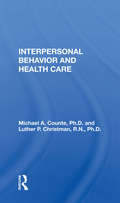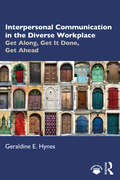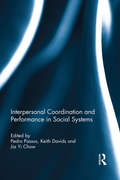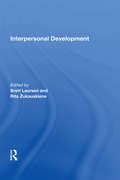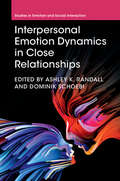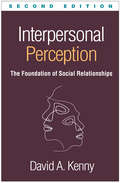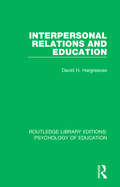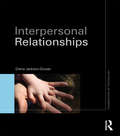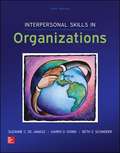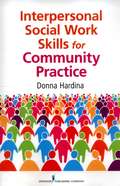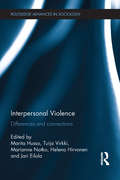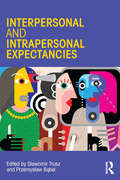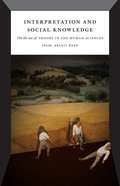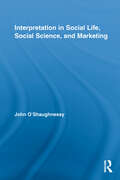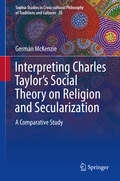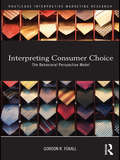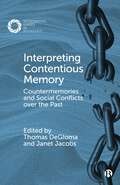- Table View
- List View
Internetnutzung im häuslichen Alltag: Räumliche Arrangements zwischen Fragmentierung und Gemeinschaft (essentials)
by Jutta Röser Corinna PeilDer Beitrag präsentiert aktuelle Befunde zur Internetnutzung im häuslichen Alltag. Die Autorinnen nehmen zunächst eine Systematisierung alltagsbezogener Rezeptionsforschung der Cultural Studies vor und führen den Domestizierungsansatz ein. Auf Basis ethnografisch orientierter Haushaltsstudien wird anschließend aufgezeigt, auf welche Weise Internetnutzung, räumliche Arrangements und häusliche Kommunikationsstrukturen miteinander interagieren. Abschließend werden verschiedene Arrangements beschrieben und deren Einflüsse auf die Herstellung von Gemeinschaft und Fragmentierung, auf geschlechtsgebundene Praktiken sowie auf Funktionen anderer Medien, insbesondere des Fernsehens, skizziert.
Interorganisationale kollaborative Gemeinschaftsforschung: Forschungscampus für den Automobilbau der Zukunft: ARENA2036 (ARENA2036)
by Roeland HoogeveenWie verhalten sich Spitzenkräfte aus Universität, Forschungseinrichtungen und Industrie unter einem Dach? Wie entstehen Ideen, was fördert die Kreativität, wie bringt man die Ergebnisse schnell aus der Forschungsfabrik in die industrielle Produktion? Diese und angrenzende Fragen werden in diesem Forschungsbericht beantwortet.Im Querschnittsbereich der ARENA2036 wurde die spezielle Arbeitsumgebung – die Forschungsfabrik – arbeitswissenschaftlich fundiert ausgestaltet. In diesem Buch werden die resultierenden Analysen und Reflexion vorgestellt. Ferner werden Methoden dargestellt, um die Technologie- und Produktentwicklung besser aufeinander abzustimmen. Ergebnisse zur interdisziplinäre Zusammenarbeit innerhalb der ARENA2036 werden diskutiert und daraus ein Ansatz zur beschleunigten Verbreitung der benötigten Kompetenzen entwickelt, die zur Nutzung grundlegend neuer Technologien benötigt werden.
Interpersonal Behavior And Health Care
by Michael A. CounteHealth care professionals are continually puzzled by people who come to their offices showing no symptoms of physical illness. They are also hard pressed to understand those who, in the face of obvious need of medical help, refuse to seek help. This textbook delves into how interpersonal processes influence the origins, functions, and change of health-related beliefs and attitudes. The authors address such questions as: Why do so many people with nonorganic complaints seek medical aid? Why do so many other people delay getting help despite the presence of medically serious symptoms? How are social networks, such as lay referral systems, linked to the use of medical services? What constitutes the cluster of attitudes called "patient satisfaction," and how are those attitudes related to actual behavior during treatment (for example, compliance with medical instructions)? What do field experiments suggest with regard to modifying health beliefs and attitudes?
Interpersonal Communication in the Diverse Workplace: Get Along, Get It Done, Get Ahead
by Geraldine HynesForegrounding the vital importance of interpersonal communication and cultural competence in the workplace, this book offers concise, practical strategies for daily communication in a global business environment. The workplace is steadily becoming more diverse, and cultural competence is widely recognized as a key to success, in terms of revenue, profit, market share, and workforce productivity. This and diversity appreciation are the two cornerstones for effective interpersonal communication, facilitating relationship development, improving job satisfaction, commitment, loyalty, and trust, and leading to performance and organizational success. The effectiveness of diversity training sessions and cultural guidebooks can vary – business professionals need a book that presents more than descriptions of culture-bound business practices or prescriptions for valuing diversity. This book is that practical solution, presenting a conceptual model along with tools to put it to work from day one, including cases and examples. With its strategies for reducing diversity miscues, techniques for responding in uncomfortable conversations, and innovative ways to bridge cultural gaps, this book will help current and aspiring leaders across industries build rapport and promote constructive behaviors in a diverse work environment, resulting in organizational success.
Interpersonal Conflict
by Keith Berry Joyce Hocker William WilmotInterpersonal Conflict 11e examines the central issues that inform conflict and, in turn, make readers’ personal and professional lives challenging and fascinating. With new cases and applications that reflect cultural changes that shape the ways people move through conflict, this new edition invites readers to reflect on, and better understand, conflict as it pertains to the unique vantage points of their lived experience.
Interpersonal Coordination and Performance in Social Systems
by Keith Davids Pedro Passos Jia Yi ChowInterpersonal coordination is an important feature of all social systems. From everyday activities to playing sport and participating in the performing arts, human behaviour is constrained by the need to continually interact with others. This book examines how interpersonal coordination tendencies in social systems emerge, across a range of contexts and at different scales, with the aim of helping practitioners to understand collective behaviours and create learning environments to improve performance. Showcasing the latest research from scientists and academics, this collection of studies examines how and why interpersonal coordination is crucial for success in sport and the performing arts. It explains the complex science of interpersonal coordination in relation to a variety of activities including competitive team sports, outdoor sports, racket sports, and martial arts, as well as dance. Divided into four sections, this book offers insight into: the nature, history and key concepts of interpersonal coordination factors that influence interpersonal coordination within social systems interpersonal coordination in competitive and cooperative performance contexts methods, tools and devices for improving performance through interpersonal coordination. This book will provide fascinating insights for students, researchers and educators interested in movement science, performance analysis, sport science and psychology, as well as for those working in the performing arts.
Interpersonal Development (The\international Library Of Psychology Ser.)
by Rita ZukauskieneThis volume brings together for the first time the papers which have shaped and defined the field of interpersonal development. It celebrates the maturation of the subject by bringing together the best work by scholars who have been instrumental in furthering the field. The twenty-seven essays describe developmental changes in interactions within specific close relationships, covering parent-child relationships, friendships and peer relationships, romantic and spousal relationships, and sibling relationships. They also detail characteristics of specific relationships and interconnections among these key features, as well as tying close relationships to individual outcomes. The essays are accompanied by an introduction which offers a brief history of the field, a review of relationship definitions and a detailed preview of the articles.
Interpersonal Emotion Dynamics in Close Relationships (Studies in Emotion and Social Interaction)
by Ashley K. Randall Dominik SchoebiEmotions play a powerful role in close relationships. Significant progress has been made in understanding the temporal features of emotions associated with the development and maintenance of close relationships across the lifespan. This advancement has revealed further questions: which theories help conceptualize interpersonal emotion dynamics? What are the ways researchers can assess and model these dynamics? How do interpersonal emotion dynamics manifest in different close relationships? And do these emotion dynamics contribute to the maintenance or dissolution of relationships? Interpersonal Emotion Dynamics in Close Relationships addresses these and other questions by bringing together state-of-the-art perspectives from scholars widely recognized for their contributions to the study of emotions in relationships. Each chapter defines interpersonal emotion dynamics, reviews methodological or empirical work, and offers important directions for future research. This volume will be a valuable resource for students, researchers, and practitioners interested in understanding the role of emotions in relationships.
Interpersonal Perception, Second Edition: The Foundation of Social Relationships
by David A. KennyPeople make judgments about others all the time, often without realizing they are doing so. How are interpersonal impressions formed? How accurate are our perceptions of other people's traits--and our own? In this major revision of his landmark work, David A. Kenny provides a reader-friendly examination of these and other critical questions, identifying key components that shape impressions and their accuracy. Topics include how to estimate perceiver, target, and relationship effects; the extent to which different perceivers see a target in the same way; the impact of group membership and stereotypes; and whether others see us as we see ourselves. Implications for interpersonal relationships and social behavior are highlighted. New to This Edition *Virtually a new book; incorporates 25 years of theoretical, empirical, and methodological advances. *New and greatly expanded topics, including first impressions, individual differences in accuracy, implicit measures, and narcissism. *Grounded in a reformulated conceptual model. *More accessible--uses nontechnical language, humor, popular culture, and simplified figures to elucidate complex ideas. *End-of-chapter "Practical Suggestions" apply the science to real-world social situations.
Interpersonal Relations and Education (Routledge Library Editions: Psychology of Education)
by David H. HargreavesOriginally published in 1972, this title provides an analysis of social interactions in educational contexts and opens up the field of the social psychology of education as an area in its own right at the very heart of the process of education. From a ‘symbolic interactionist’ perspective, the author develops a framework for the study of relations between teachers and pupils, discussing the basic ways of analysing social interaction, including the concepts of perception and role. He examines the distinctive perspectives of teachers and pupils on their relationships, bringing together into a coherent framework the insights of such writers as John Holt and Carl Rogers, and within this context he explores the notion of ‘voluntary schooling’. The book also deals with other important aspects of education such as discipline, classroom group dynamics and the relations between headteachers and their staff. The theories put forward by the author are firmly grounded in the daily experience of teachers and pupils in the classroom at the time. The book was expected to be of value to experienced teachers and student teachers alike, as well as to teachers of the social sciences in general.
Interpersonal Relationships (Foundations of Psychology)
by Diana Jackson-DwyerWith a more specific focus than the all-encompassing textbook, each title in the Foundations of Psychology series enables students who are new to psychology to get to grips with a key area of psychological research, while also developing an understanding of basic concepts, debates, and research methodologies. In this book Diana Jackson-Dwyer presents an introductory survey of classic and recent research on relationships and the theories that underpin them. The book starts with a brief overview of the place of relationships within the history of psychology and of their evolutionary roots: our need to belong, to attach and to affiliate. After a look at methodology, it considers different types of relationships: kinship, friendship, loving and mating. Theories are advanced to explain the formation, maintenance and breakdown of relationships. The book draws on a wide array of contemporary research, and covers issues ranging from rising divorce rates to cultural variations in mating patterns, the issue of gay marriage, and the effect of the internet on relationships. Each chapter contains numerous pedagogical features which will help students to engage with the material: Chapter-specific learning objectives and summaries of key points Study boxes presenting reflective exercises, research questions, and issues for discussion Glossaries and suggestions for further reading Assuming no prior knowledge of the subject, Interpersonal Relationships provides an accessible and up-to-date overview of this vibrant area of psychology. The book will be ideal reading for students who are new to higher-level study - whether at school, college or university, and will also be useful for first-year undergraduate students taking introductory courses in psychology.
Interpersonal Relationships: Professional Communication Skills for Nurses
by Rn Kathleen Underman Boggs Elizabeth C. Arnold Pmhcns-Bc Fnp-CsEffective communication with clients, families, and professional colleagues starts here! With Interpersonal Relationships: Professional Communication Skills for Nurses, 7th Edition, you'll see how good communication skills can lead to achieving treatment goals in health care. Clear guidelines show how you can enhance the nurse-client relationship through proven communication strategies as well as principles drawn from nursing, psychology, and related theoretical frameworks. And you'll see how to apply theory to real-life practice with case studies, interactive exercises, and evidence-based practice studies. A two-time winner of the AJN Book of the Year award, this book is updated to emphasize interdisciplinary communication and QSEN competencies. From expert nursing educators Elizabeth Arnold and Kathleen Underman Boggs, this comprehensive, market-leading text is unmatched for helping nurses develop effective communication skills! Interactive exercises offer the opportunity to practice, observe, and critically evaluate your professional communication skills in a safe learning environment. Practical guidelines describe how to modify communications strategies for various populations and situations including children, the elderly, end of life, clients with special needs, health teaching, stress, crisis, and professional colleagues. Case examples help you develop empathy for clients' perspectives and needs. Nursing, behavioral, developmental, family, and communication theories provide an essential foundation and a theoretical perspective for effective communication. Learning objectives, chapter overviews, and a detailed glossary focus your study and help you absorb and retain key content. NEW! A greater emphasis on communication, interdisciplinary theory, and interprofessionalism includes a focus on the nursing paradigm, nursing discipline, and ways of knowing. NEW! Focus on QSEN competencies reflects current thinking on technology, safety, and evidence-based practice, especially as they relate to communication in nursing. NEW! Discussion questions at the end of each chapter encourage critical thinking. NEW! Clarity and Safety in Communication chapter addresses topics such as huddles, rounds, handoffs, SBAR, and other forms of communication in health care.
Interpersonal Skills In Organizations (Fifth Edition)
by Suzanne C. De Janasz Karen O. Dowd Beth Z. SchneiderInterpersonal Skills in Organizations by de Janasz, Dowd, and Schneider takes a fresh, thoughtful look at the key skills necessary for personal and managerial success in organizations today. Exploding with exercises, cases, and group activities, the book employs an experiential approach suitable for all student audiences. The book is organized into 4 distinct sections (Understanding Yourself, Understanding Others, Understanding Teams, and Leading) that can be used collectively or modularly depending on the instructors' preferences and students' needs. The emphasis in this edition focuses on making the text more current along with making the text pedagogically effective for students and instructors.
Interpersonal Social Work Skills For Community Practice
by Donna HardinaSpecifically dedicated to the "skills" that social workers need to advance community practice, this creative book is long overdue. Grounded in the wisdom and evidence of well-honed interpersonal social work skills. . . Donna Hardina's new text takes community practice to a higher level than ever before developed in book form; indeed she displays the most thorough understanding of research on community practice that I have read in any community practice text.
Interpersonal Violence: Differences and Connections (Routledge Advances in Sociology)
by Marita Husso, Tuija Virkki, Marianne Notko, Helena Hirvonen and Jari EilolaFrom early modernity to today, society has encountered various forms of interpersonal violence. Through exploration of particular areas within Europe and Russia to Africa, America and Asia, this collection presents both differences and connections among various forms of interpersonal violence in different times, places, institutional orders and relationships. Interpersonal Violence introduces research results from studies in various disciplines, such as history, sociology, social policy social work, cultural studies, and gender studies. In focusing on the diverse and often ignored social locations and cultural backgrounds of interpersonal violence, the book demonstrates 1) how the specificity of temporality and spatiality affect the manifestation of violence, 2) how the dynamics of intersectional and institutional differences are located in social space and time, and 3) how the different forms of violence in different times are affectively, conceptually and discursively connected. With its comprehensive and integrative approach, this book is a key tool book for understanding the phenomenon and cultural conceptions of interpersonal violence. It would be most suitable for upper level undergraduates, graduates doctoral students interested in social sciences, history, criminology, psychology, cultural studies, education, gender studies and public health.
Interpersonal and Intrapersonal Expectancies
by Sławomir Trusz Przemysław BąbelDo our expectancies about ourselves and about others have any effect on our actual experiences? Over fifty years of research studies suggest not only that this is the case, but also that our expectancies can shape other people’s experience in different contexts. In some cases they can help, but other times they can do harm instead. Interpersonal and Intrapersonal Expectancies provides a theory, a research review, and a summary of the current knowledge on intra- and interpersonal expectancy effects and related phenomena. Based on extensive study, and written by eminent experts from some of the world’s leading academic institutions, the book presents the most recent knowledge on social and psychological mechanisms of forming both intra- and interpersonal expectancies. It also considers how expectancies are sustained and what their consequences are, as well as discussing the latest theoretical concepts and the most up-to-date research on expectancy effects. This book represents the first review of the phenomenon of interpersonal expectancies in over 20 years, and the only publication presenting a complementary view of both intra- and interpersonal expectancies. It aims to open up a discussion between researchers and theoreticians from both perspectives, and to promote an integrative approach that incorporates both.
Interpretation and Social Knowledge: On the Use of Theory in the Human Sciences
by Isaac Ariail ReedFor the past fifty years anxiety over naturalism has driven debates in social theory. One side sees social science as another kind of natural science, while the other rejects the possibility of objective and explanatory knowledge. Interpretation and Social Knowledge suggests a different route, offering a way forward for an antinaturalist sociology that overcomes the opposition between interpretation and explanation and uses theory to build concrete, historically specific causal explanations of social phenomena.
Interpretation and Social Knowledge: On the Use of Theory in the Human Sciences
by Isaac Ariail ReedFor the past fifty years anxiety over naturalism has driven debates in social theory. One side sees social science as another kind of natural science, while the other rejects the possibility of objective and explanatory knowledge. Interpretation and Social Knowledge suggests a different route, offering a way forward for an antinaturalist sociology that overcomes the opposition between interpretation and explanation and uses theory to build concrete, historically specific causal explanations of social phenomena.
Interpretation in Social Life, Social Science, and Marketing (Routledge Interpretive Marketing Research)
by John O'Shaughnessy'Interpretation' is used as an umbrella for bringing together a wide range of concepts and developments in the philosophy of social science that provide the foundation for clear thinking about social phenomena. In his new book, John O’Shaughnessy familiarises the reader with the nature of interpretation and its importance in social life, decision making in social science enquiries and consumer marketing, thus offering a multidisciplinary approach to problems of bias and uncertainty. Thus, this book is novel in its outlook and comprehensive in its approach. Whereas past studies in interpretation have focused on hermeneutical methods, O’Shaughnessy goes further considering the role of interpretation in social interactions, in undertaking scientific work, in the use of statistics, in causal analysis, in consumer evaluations of products and artifacts and in interpreting problematic situations together with the corresponding biases arising from emotional happiness and the concepts employed.
Interpretation: Making A Difference On Purpose
by Sam H. HamIn the new edition of the international bestseller Environmental Interpretation, Sam H. Ham captures what has changed in our understanding of interpretation during the past two decades. Ham draws on recent advances in communication research to unveil a fresh and invigorating perspective that will lead interpreters to new and insightful pathways for making a difference on purpose through their work.
Interpretative Phenomenological Analysis: Theory, Method and Research
by Jonathan A. Smith Paul Flowers Michael Larkin'It is not often I can use "accessible" and "phenomenology" in the same sentence, but reading the new book, Interpretative Phenomenological Analysis…certainly provides me the occasion to do so. I can say this because these authors provide an engaging and clear introduction to a relatively new analytical approach' - The Weekly Qualitative Report Interpretative phenomenological analysis (IPA) is an increasingly popular approach to qualitative inquiry. This handy text covers its theoretical foundations and provides a detailed guide to conducting IPA research. Extended worked examples from the authors' own studies in health, sexuality, psychological distress and identity illustrate the breadth and depth of IPA research. Each of the chapters also offers a guide to other good exemplars of IPA research in the designated area. The final section of the book considers how IPA connects with other contemporary qualitative approaches like discourse and narrative analysis and how it addresses issues to do with validity. The book is written in an accessible style and will be extremely useful to students and researchers in psychology and related disciplines in the health and social sciences.
Interpreter-mediated Police Interviews
by Ikuko NakaneThis book shows how the participation of interpreters as mediators changes the dynamics of police interviews, particularly with regard to power struggles and competing versions of events. Employing a range of approaches including conversation analysis, interactional sociolinguistics and legal narrative theory, Interpreter-mediated Police Interviews provides a detailed study of the impact of interpreter mediation on this area of the justice system. It reveals how turn-by-turn decisions of communication by all three participants, including the interpreter, affect the trajectory of the institutional discourse. By providing a better understanding of police interview discourse and exploring the practical implications of interpreter participation, this book contributes to the improvement of interpreter-mediated investigative interviews and will be of great interest to legal professionals as well as interpreters and their trainers.
Interpreting Charles Taylor’s Social Theory on Religion and Secularization
by Germán MckenzieThis book examines "Taylorean social theory," its sources, main characteristics and impact. Charles Taylor's meta-narrative of secularization in the West, prominently contained in his major work A Secular Age (2007), has brought new insight on the social and cultural factors that intervened in such process, the role of human agency, and particularly on the contemporary conditions of belief in North America and Europe. This study discusses what Taylor's approach has brought to the scholarly debate on Western secularization, which has been carried on mostly in sociological terms. McKenzie interprets Taylor's views in a way that offers an original social theory. Such interpretation is possible with the help of sociologist Margaret Archer's "morphogenetic theory" and by making the most of Taylor's particular understanding of the method of the social sciences and of his philosophical views on human beings, knowledge and modernity. After exploring the philosophical and sociological sources informing Taylorean social theory and proposing its basic concepts and hermeneutic guidelines, the author compares it with two widespread theories of secularization: the now waning "orthodox" account and that proposed by Rational Choice Theory scholars, particularly prevalent in the United States. In doing so, the book shows in which ways Taylorean social theory supersedes them, what new issues it brings into the scholarly discussion, and what difficulties might limit its future development.
Interpreting Consumer Choice: The Behavioural Perspective Model (Routledge Interpretive Marketing Research)
by Gordon FoxallInterpretive consumer research usually proceeds with a minimum of structure and preconceptions. This book presents a more structured approach than is usual, showing how a simple framework that embodies the rewards and costs associated with consumer choice can be used to interpret a wide range of consumer behaviours from everyday purchasing and saving, innovative choice, imitation, ‘green’ consumer behavior, to compulsive behaviors such as addictions (to shopping, to gambling, to alcohol and other drugs, etc). Foxall takes a qualitative approach to interpreting behavior, focusing on the epistemological problems that arise in such research and emphasizing the emotional as well as cognitive aspects of consumption. The author argues that consumer behaviour can be understood with the aid of a very simple model that proposes how the consequences of consumption impact consumers’ subsequent choices. The objective is to show that a basic model can be used to interpret consumer behaviour in general, not in isolation from the marketing influences that shape it, but as a course of human choice that is dynamically linked with managerial concerns.
Interpreting Contentious Memory: Countermemories and Social Conflicts over the Past
by Thomas DeGloma and Janet JacobsMemory is at the center of a diverse array of political conflicts, moral disputes, and power dynamics. This book illustrates how scholars use different interpretive lenses to study and explain profound conflicts rooted in the past. Addressing issues of racism, genocide, trauma, war, nationalism, colonial occupation, and more, it highlights how our interpretations of contentious memories are indispensable to our understandings of contemporary conflicts and identities. Featuring an international group of scholars, this book makes important contributions to social memory studies, but also shows how studying memory is vital to our understanding of enduring social problems that span the globe.


